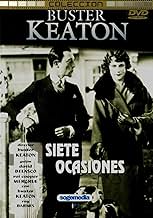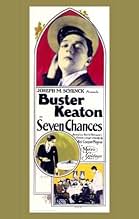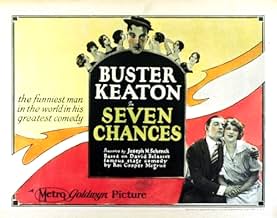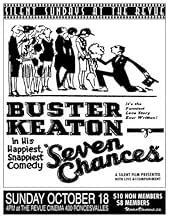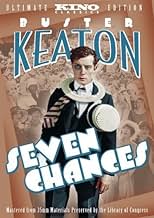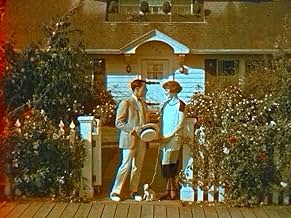NOTE IMDb
7,8/10
13 k
MA NOTE
Un homme apprend qu'il héritera d'une fortune s'il se marie avant 19 heures le jour même.Un homme apprend qu'il héritera d'une fortune s'il se marie avant 19 heures le jour même.Un homme apprend qu'il héritera d'une fortune s'il se marie avant 19 heures le jour même.
- Réalisation
- Scénario
- Casting principal
- Récompenses
- 1 victoire et 1 nomination au total
Frances Raymond
- Her Mother
- (as Frankie Raymond)
Jean Arthur
- Miss Smith - Office Receptionist
- (non crédité)
Lori Bara
- Mother of Underage Girl
- (non crédité)
Rosalind Byrne
- Hat Check Girl
- (non crédité)
Louise Carver
- Prospective Bride Who Operates Crane
- (non crédité)
Avis à la une
Contrary to what you may have read, "Seven Chances" (1925) was made before Buster Keaton signed with MGM and relinquished artistic control over his own films. His gifts of extraordinary agility, timing, and visualizing the comic potential in the most mundane situations are everywhere in evidence.
The plot of "Seven Chances" is ancient. A young bachelor stands to inherit millions if he can find a bride by a certain day and marry at a certain hour. The date is invariably the same as the day the will is read, and in the hands of Keaton, his writers and cast, the comic possibilities are brilliantly exploited. The same premise was the basis for at least three other films before Keaton's, and was remade (abysmally -- from what I've read) as "The Bachelor" with Chris O'Donnell in 1999. The chain of events that flows from news of the inheritance just builds and builds over the course of the film, the gags growing increasingly clever as time grows shorter. "Seven Chances" clocks in at less than an hour, but the final 15 minutes (which Buster Keaton reportedly reworked several times) are among the most hilarious in all of silent film, perhaps in the history of screen comedy.
Initially, only Buster, his business partner (T. Ray Brown) and the lawyer (Snitz Edwards, who was so terribly homely he was cute) are aware of the dilemma. After Buster botches a proposal to his longtime girlfriend, (Ruth Dwyer), he pops the question to several more female acquaintances, with predictably embarrassing results. It is then that Brown and Edwards (unbeknownst to Buster) decide to place a newspaper announcement advertising his plight.
Once the newspapers hit the streets, the chase is on. Keaton is pursued through 1920s Los Angeles by dozens, then scores, then seemingly hundreds of would-be brides. They come in all ages, shapes and sizes, makeshift veils trailing after them. No obstacle is too great in their pursuit to beat out each other for the prize of marriage to a man they don't even know, and Buster throws out plenty of roadblocks in his wake.
In 1979, Walter Kerr wrote the definitive book on silent comedies, "The Silent Clowns." One of the jacket blurbs reads, "I found myself laughing out loud at routines from movies I have never seen." I don't have Kerr's gift, but I can tell you that "Seven Chances" is the most consistently funny movie Buster Keaton ever made. All of his movies include inventive sight gags, but "Seven Chances," more than most of Buster's movies, relies on character comedy as well as situational comedy for its humor. And it scores a bull's eye on both. A sheer delight.
The plot of "Seven Chances" is ancient. A young bachelor stands to inherit millions if he can find a bride by a certain day and marry at a certain hour. The date is invariably the same as the day the will is read, and in the hands of Keaton, his writers and cast, the comic possibilities are brilliantly exploited. The same premise was the basis for at least three other films before Keaton's, and was remade (abysmally -- from what I've read) as "The Bachelor" with Chris O'Donnell in 1999. The chain of events that flows from news of the inheritance just builds and builds over the course of the film, the gags growing increasingly clever as time grows shorter. "Seven Chances" clocks in at less than an hour, but the final 15 minutes (which Buster Keaton reportedly reworked several times) are among the most hilarious in all of silent film, perhaps in the history of screen comedy.
Initially, only Buster, his business partner (T. Ray Brown) and the lawyer (Snitz Edwards, who was so terribly homely he was cute) are aware of the dilemma. After Buster botches a proposal to his longtime girlfriend, (Ruth Dwyer), he pops the question to several more female acquaintances, with predictably embarrassing results. It is then that Brown and Edwards (unbeknownst to Buster) decide to place a newspaper announcement advertising his plight.
Once the newspapers hit the streets, the chase is on. Keaton is pursued through 1920s Los Angeles by dozens, then scores, then seemingly hundreds of would-be brides. They come in all ages, shapes and sizes, makeshift veils trailing after them. No obstacle is too great in their pursuit to beat out each other for the prize of marriage to a man they don't even know, and Buster throws out plenty of roadblocks in his wake.
In 1979, Walter Kerr wrote the definitive book on silent comedies, "The Silent Clowns." One of the jacket blurbs reads, "I found myself laughing out loud at routines from movies I have never seen." I don't have Kerr's gift, but I can tell you that "Seven Chances" is the most consistently funny movie Buster Keaton ever made. All of his movies include inventive sight gags, but "Seven Chances," more than most of Buster's movies, relies on character comedy as well as situational comedy for its humor. And it scores a bull's eye on both. A sheer delight.
I'm sorry to hear that Keaton didn't care for this film, because it was a truncated version of this film that introduced me to Buster Keaton when I was about six.
When the film gets going, it really takes off and I mean off the ground. The big chase in this film is a joy to see.
This is a must see Keaton film.
When the film gets going, it really takes off and I mean off the ground. The big chase in this film is a joy to see.
This is a must see Keaton film.
I love Seven Chances as much if not more than any of Keaton's other features, even if it does not enjoy the same reputation as The General or Sherlock, Jr. Using the sure-fire concept of a man who must take a wife or lose a fortune, Buster builds and executes one of his greatest extended gag sequences -- the chase of the reluctant groom by the army of brides. The first sections of the film detail Buster's inability to get anyone to take his proposal of marriage seriously, and then Buster pulls out all the stops on the famine to feast prospect once scores of women of all shapes and sizes begin to hunt down our hero while dressed in their wedding gowns. Seven Chances completely capitalizes on its comic potential, and Buster offers up another unbelievable tour de force of superb movie making.
Jimmie Shannon (Buster Keaton) is a broker in need of money. When a lawyer comes to tell him he has inherited a certain sum, Jimmie avoids him thinking he may be bringing a summons. And then when he does hear the good news, there's a catch...
Directed by and starring Buster Keaton, this film portrays his particular brand of physical comedy, though perhaps not with as much danger as "The General" or as many tricks as "Sherlock Jr." The music of Robert Israel really carries this film. Not just because it's a silent film, but because it's great music -- moving, light and comedic. And there is an implied racial tone... Jimmie passes on proposing to both a Jew and a black woman.
I literally "laughed out loud" at this film! It is a shame Keaton considered it his worst film. Who knew it was so hard to get someone to marry you for $7,000,000 (in 1925 money, no less)?
Directed by and starring Buster Keaton, this film portrays his particular brand of physical comedy, though perhaps not with as much danger as "The General" or as many tricks as "Sherlock Jr." The music of Robert Israel really carries this film. Not just because it's a silent film, but because it's great music -- moving, light and comedic. And there is an implied racial tone... Jimmie passes on proposing to both a Jew and a black woman.
I literally "laughed out loud" at this film! It is a shame Keaton considered it his worst film. Who knew it was so hard to get someone to marry you for $7,000,000 (in 1925 money, no less)?
Buster Keaton catapults himself down a steep hillside, an avalanche of pebbles, rocks and boulders tumbling in his wake. If any one of these objects were to strike him down, he would certainly be killed by the impact. He is almost escaping the rocks now; just a few more seconds of frantic sprinting is required. Suddenly, Keaton looks up, only to find a massive horde of woman striding purposefully towards him. He is stuck between a rock and a hard place: an avalanche behind him, and a flock of would-be brides ahead. Quickly and delicately weighing his chances of survival either way, Keaton turns determinedly towards the barrage of boulders. It is hilarious little moments like this that make Buster Keaton's silent comedies such a joy to watch, and 'Seven Chances' is certainly one of the funniest I've seen, brimming with the talented actor's trademark deadpan humour.
The premise on which the story is based is singularly ridiculous, and so this allows Keaton to have a great deal of fun, placing his character in appropriately bizarre situations. Young Jimmy Shannon (Keaton) loves his sweetheart Mary Jones (Ruth Dwyer), but can never quite muster up the courage to tell her, and most certainly could never take that plunge into marriage. However, one day he discovers that his grandfather has left him the princely sum of $7 million, but only if he gets married by 7 PM that day! After he is rejected by Mary (due to an unfortunate misunderstanding), Jimmy seeks out another would-be bride, ultimately realising that finding a wife isn't as easy as he had hoped. The first half of the film is admittedly light on Keaton's patented stunt-work, but it remains a clever and witty situation comedy, with poor Jimmy suffering the laughter of onlookers as he moves from one girl to the next, tentatively asking for their hands in marriage.
When all this fails, an advertisement in the afternoon-edition newspaper brings hundreds of women to Jimmy's side, but by now he's realised that Mary is the only girl he could ever marry. As he struggles desperately to get to her home by 7:00, he is pursued by a horde of money-crazy ladies: big and small, young and old, beautiful and ugly. This is truly where Keaton comes into his element, and a hectic scramble down a hillside pursued by an avalanche of rocks is the film's most memorable moment {the idea for this scene came by accident, when Keaton inadvertently dislodged some rocks while he was running. The preview audience responded so favourably that he decided to re-shoot an extended sequence}. The paper-mâché rocks look quite convincing, and I was pretty much fooled into thinking that Keaten was really dodging the real thing (until I noticed him get bowled over by one of the boulders, without any apparent ill-effects!) 'Seven Chances' moves by at such a frenetic pace that there isn't a moment that could be trimmed. Though it runs for just 56 minutes, I had a huge smile on my face for every single one of them.
The premise on which the story is based is singularly ridiculous, and so this allows Keaton to have a great deal of fun, placing his character in appropriately bizarre situations. Young Jimmy Shannon (Keaton) loves his sweetheart Mary Jones (Ruth Dwyer), but can never quite muster up the courage to tell her, and most certainly could never take that plunge into marriage. However, one day he discovers that his grandfather has left him the princely sum of $7 million, but only if he gets married by 7 PM that day! After he is rejected by Mary (due to an unfortunate misunderstanding), Jimmy seeks out another would-be bride, ultimately realising that finding a wife isn't as easy as he had hoped. The first half of the film is admittedly light on Keaton's patented stunt-work, but it remains a clever and witty situation comedy, with poor Jimmy suffering the laughter of onlookers as he moves from one girl to the next, tentatively asking for their hands in marriage.
When all this fails, an advertisement in the afternoon-edition newspaper brings hundreds of women to Jimmy's side, but by now he's realised that Mary is the only girl he could ever marry. As he struggles desperately to get to her home by 7:00, he is pursued by a horde of money-crazy ladies: big and small, young and old, beautiful and ugly. This is truly where Keaton comes into his element, and a hectic scramble down a hillside pursued by an avalanche of rocks is the film's most memorable moment {the idea for this scene came by accident, when Keaton inadvertently dislodged some rocks while he was running. The preview audience responded so favourably that he decided to re-shoot an extended sequence}. The paper-mâché rocks look quite convincing, and I was pretty much fooled into thinking that Keaten was really dodging the real thing (until I noticed him get bowled over by one of the boulders, without any apparent ill-effects!) 'Seven Chances' moves by at such a frenetic pace that there isn't a moment that could be trimmed. Though it runs for just 56 minutes, I had a huge smile on my face for every single one of them.
Le saviez-vous
- AnecdotesBuster Keaton had this project foisted upon him by producer Joseph M. Schenck, who had bought the rights to the hit Broadway show. Keaton later called it his least favorite feature and tried to keep film historian Raymond Rohauer from restoring the only known copy of the movie.
- GaffesJust as the horde of would-be brides overruns the college football game, one of the players can be seen throwing himself to the ground, already pretending to be trampled.
- Citations
Title Card: By the time Jimmie had reached the church, he had proposed to everything in skirts, including a Scotchman.
- ConnexionsFeatured in 4 Clowns (1970)
Meilleurs choix
Connectez-vous pour évaluer et suivre la liste de favoris afin de recevoir des recommandations personnalisées
- How long is Seven Chances?Alimenté par Alexa
Détails
Box-office
- Montant brut mondial
- 268 $US
- Durée
- 56min
- Couleur
- Mixage
- Rapport de forme
- 1.33 : 1
Contribuer à cette page
Suggérer une modification ou ajouter du contenu manquant

![Regarder Trailer [OV]](https://m.media-amazon.com/images/M/MV5BNTUxNzY1MzYtN2MzMS00Yzc0LWIyNmMtYTE1ZmJhYTlkMDI4XkEyXkFqcGdeQXRyYW5zY29kZS13b3JrZmxvdw@@._V1_QL75_UX500_CR0)

